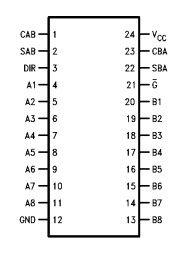DM74ALS646: Features: Switching specifications at 50 pF Switching specifications guaranteed over full tempera-ture and VCC range Advanced oxide-isolated, ion-implanted Schottky TTL process 3-STATE buffer output...
floor Price/Ceiling Price
- Part Number:
- DM74ALS646
- Supply Ability:
- 5000
Price Break
- Qty
- 1~5000
- Unit Price
- Negotiable
- Processing time
- 15 Days
SeekIC Buyer Protection PLUS - newly updated for 2013!
- Escrow Protection.
- Guaranteed refunds.
- Secure payments.
- Learn more >>
Month Sales
268 Transactions
Payment Methods
All payment methods are secure and covered by SeekIC Buyer Protection PLUS.

 DM74ALS646 Data Sheet
DM74ALS646 Data Sheet








